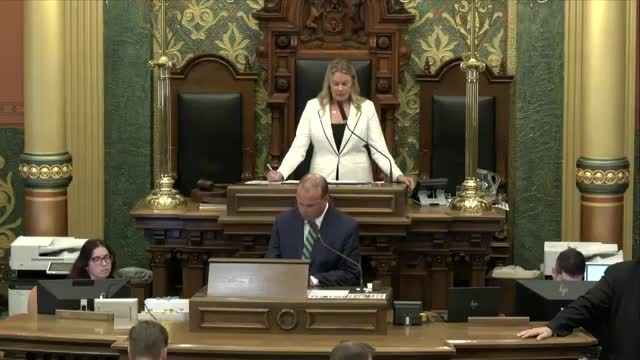Michigan House Advances Multiple Bills Including Mental Health and Occupational Safety Amendments
July 25, 2025 | 2025 House Legislature MI, Michigan
This article was created by AI summarizing key points discussed. AI makes mistakes, so for full details and context, please refer to the video of the full meeting. Please report any errors so we can fix them. Report an error »

In a recent session of the Michigan House of Representatives held on July 24, 2025, lawmakers engaged in a series of discussions and votes on several bills, reflecting ongoing legislative priorities in the state. The session was marked by the advancement of multiple bills through various stages of the legislative process, highlighting the House's focus on mental health, public safety, and infrastructure.
One of the key discussions centered around House Bill 4219, which aims to amend the mental health code. The bill was introduced by Representative Thompson and successfully advanced to the third reading after the adoption of a substitute amendment recommended by the Health Policy Committee. This legislative move underscores the state's commitment to enhancing mental health services, a critical issue given the rising awareness of mental health challenges in communities across Michigan.
Another significant bill, House Bill 4362, introduced by Representative Johnson, seeks to amend the Moselle Senior and Vulnerable Adult Medical Alert Act. This legislation is particularly relevant as it aims to improve protections for vulnerable populations, ensuring that seniors and those with disabilities receive timely assistance in emergencies. The bill also advanced to the third reading without objection, indicating broad support among lawmakers.
The House also addressed infrastructure concerns with House Bill 4415, which revises laws related to public highways. This bill, introduced by an unnamed representative, was similarly advanced after adopting a substitute amendment. The focus on infrastructure reflects ongoing efforts to maintain and improve Michigan's transportation systems, which are vital for economic growth and public safety.
In a notable moment during the session, House Bill 4141, aimed at amending the revised school code, faced a more contentious debate. Despite the adoption of multiple amendments, the bill ultimately did not pass, with a final vote tally of 53 in favor and 45 against. This outcome highlights the complexities and differing opinions surrounding educational reforms in the state.
Overall, the session demonstrated the Michigan House's active role in addressing pressing issues through legislative action. As lawmakers continue to navigate these discussions, the implications of their decisions will likely resonate throughout the state, impacting various sectors including health care, public safety, and education. The next steps for these bills will be closely monitored as they progress through the legislative process.
One of the key discussions centered around House Bill 4219, which aims to amend the mental health code. The bill was introduced by Representative Thompson and successfully advanced to the third reading after the adoption of a substitute amendment recommended by the Health Policy Committee. This legislative move underscores the state's commitment to enhancing mental health services, a critical issue given the rising awareness of mental health challenges in communities across Michigan.
Another significant bill, House Bill 4362, introduced by Representative Johnson, seeks to amend the Moselle Senior and Vulnerable Adult Medical Alert Act. This legislation is particularly relevant as it aims to improve protections for vulnerable populations, ensuring that seniors and those with disabilities receive timely assistance in emergencies. The bill also advanced to the third reading without objection, indicating broad support among lawmakers.
The House also addressed infrastructure concerns with House Bill 4415, which revises laws related to public highways. This bill, introduced by an unnamed representative, was similarly advanced after adopting a substitute amendment. The focus on infrastructure reflects ongoing efforts to maintain and improve Michigan's transportation systems, which are vital for economic growth and public safety.
In a notable moment during the session, House Bill 4141, aimed at amending the revised school code, faced a more contentious debate. Despite the adoption of multiple amendments, the bill ultimately did not pass, with a final vote tally of 53 in favor and 45 against. This outcome highlights the complexities and differing opinions surrounding educational reforms in the state.
Overall, the session demonstrated the Michigan House's active role in addressing pressing issues through legislative action. As lawmakers continue to navigate these discussions, the implications of their decisions will likely resonate throughout the state, impacting various sectors including health care, public safety, and education. The next steps for these bills will be closely monitored as they progress through the legislative process.
View full meeting
This article is based on a recent meeting—watch the full video and explore the complete transcript for deeper insights into the discussion.
View full meeting
